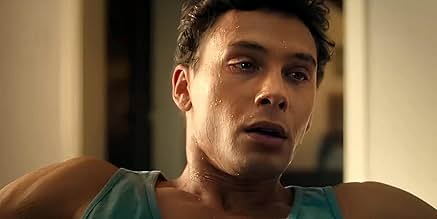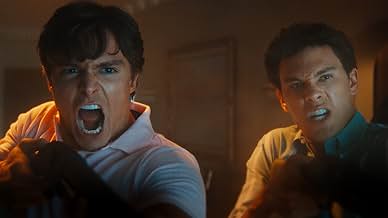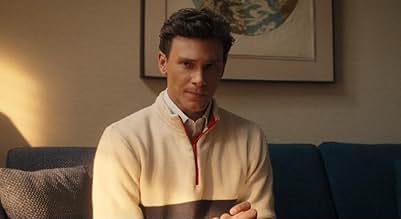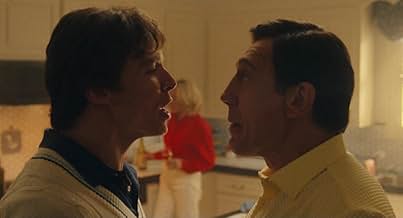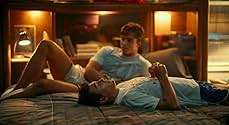Blame It on the Rain
- Episode aired Sep 19, 2024
- TV-MA
- 57m
Plagued by dark thoughts after the murders, Erik opens up to his therapist and shares disturbing details that put the doctor in a difficult position.Plagued by dark thoughts after the murders, Erik opens up to his therapist and shares disturbing details that put the doctor in a difficult position.Plagued by dark thoughts after the murders, Erik opens up to his therapist and shares disturbing details that put the doctor in a difficult position.
- Chauffeur
- (as Kamy Bruder)
- Yoda (Trick-or-Treater)
- (as Jaja Corral)
- Half-Assed Zombie (Trick-or-Treater)
- (as Grayson Kilpatrick)
- AMC Girl
- (as Shelby Lee)
Featured reviews
Ryan Murphy's latest Crime anthology at times stretches credibility even beyond his realms of fantasy . Many of its so called facts have been widely disputed by the actual people people involved including Lyle and Erik Menendez from their separate prison cells .
As an entertainment I found The Lyle and Menendez story one dimensional and lacking impact although it's well acted .
Especially by the 2 main stars Cooper Koch as Eric and Nicholas Alexander Chavez as Lyle Menendez.
Unlike the thrilling first series of Monsters which told the chilling story of serial killer Jeffrey Dahmer the question of who the monster or monsters were is not answered in the Menendez story?
For me the Inconsistencies and lack of credibility started from the first episode when we see the murder of Kitty and Jose Menendez in graphic detail with a deafening barrage of gunshots that would have woken up every neighbour in a mile radius .
No spoilers but the murderers just take off from the murder scene from their parents mansion in their luxury car to try and establish an alibi.
Chloë Sevigny and Javier Bardem as the parents from hell Kitty and Jose Menendez didn't impress me at all .
I thought they played their roles in a melodramatic campy style that really lacked any room to understand or develop their characters in much detail.
I blame the script writers Ryan Murphy and Ian Brennan who seem to place style over substance in this series .
Based on the actual crime and trials that sent the two brothers to separate prison life sentences for the brutal murder of their parents Monsters: The Lyle And Erik Menendez Story a nine part series is puzzling to me ?
Why did Ryan Murphy portray the brothers as intimate lovers as this has been categorically denied not only by Lyle and Erik but many others.
Perhaps it was to appeal to his wide LGBTQ audience .
The most annoying characters in the series for me are investigative reporter Dominick Dunne played by a favourite actor of mine Nathan Lane and Leslie Abramson played by Ari Graynor they also both seem to play their roles in a campy stagy manner.
This series is obviously very popular I read it's the most popular series on Netflix but then I seem to read that about every new Netflix series these days .
I'm glad I watched it and I did enjoy parts of it but just wondered how a great director like Alfred Hitchcock would have presented this tragic and brutal chain of events?
The episode begins with Lyle and Erik Menendez portrayed by Nicholas Alexander Chavez and Cooper Koch, respectively, riding in a luxurious limousine en route to their parents' memorial, their interaction layered with a mix of bravado, vulnerability, and suppressed rage. The opening moments cleverly pivot between the brothers' external composure and their internal unraveling. Scenes depict Lyle forcibly maintaining control, demanding the chauffeur switch the radio station to reflect his desired mood, while Erik reveals intermittent breakdowns, embodying the psychological strain that the brothers silently endure. The use of music and sound in these sequences amplifies the emotional ambience and foreshadows escalating familial conflict.
Crucially, Franklin situates the narrative within a darkly opulent backdrop, representative of privilege and repression, which contrasts sharply with the brothers' emotional degradation. Cinematographically, the episode employs muted tones and claustrophobic framing to depict the suffocating nature of their environment-an aesthetic reminiscent of classic psychological thrillers but refracted through a contemporary trauma lens. The production design captures the late 1980s/early 1990s with striking authenticity, enhancing narrative immersion.
The screenplay oscillates between present-day moments and flashbacks that illuminate the brothers' strained relationships with their parents. Key flashbacks reveal José (played by Javier Bardem) and Kitty Menendez's (Chloe Sevigny) volatile marriage, laced with authoritarian control, emotional neglect, and underlying familial dysfunction. One intense scene highlights Kitty's derisive treatment of Lyle's bald spot, symbolizing not only parental cruelty but broader themes of emasculation and vulnerability. Conversely, moments between the brothers exhibit fractured solidarity, marked by mutual support yet fraught with mistrust and psychological paranoia, as they grapple with their shared trauma and difficult decisions.
The episode's pacing balances its heavy thematic content with suspenseful tension, particularly during sequences depicting the forthcoming crime's buildup. Tense moments, such as Erik's imagined gunfire and the brothers' weapon preparations, are intercut with more mundane yet emotionally charged scenes, creating a constant undercurrent of unease. Editor's rhythmic cuts and sharp sound choices, including abrupt silences and bursts of amplified noise, heighten the sense of impending violence.
Performances anchor the episode's impact. Cooper Koch and Nicholas Alexander Chavez deliver nuanced portrayals of Erik and Lyle, capturing their evolving psychological states without resorting to sensationalism. Bardem's José is authoritative and menacing, while Sevigny's Kitty offers a layered depiction of frustration and emotional desolation. Dashcam performances are characterized by subtlety, revealing the characters' inner turmoil through restrained gestures and facial expressions.
Thematically, "Blame It on the Rain" interrogates the destructive effects of familial control, emotional abuse, and the corrosive intersection of wealth and dysfunction. It also lays the groundwork for moral ambiguity, refusing easy judgments while evoking empathy and horror simultaneously. The episode, replete with symbolic imagery such as the recurring motif of rain, metaphorically suggests cleansing, futility, and emotional turbulence.
Contextually, the episode situates itself within a true crime tradition that strives for psychological depth over sensational spectacle, echoing the narrative strategies of acclaimed crime anthologies and psychological dramas. It references earlier works on the Menendez case but attempts to distinguish itself through its stylistic ambition and character-driven focus. Directorially, Carl Franklin's measured and atmospheric approach complements the series' broader aesthetic consistency across seasons.
Despite its strong construction, the episode has met some critique for the well-trod nature of the material, as the Menendez case has been exhaustively covered in media and literature. Critics suggest that while the performances and thematic layering salvage the narrative, the story delivers little groundbreaking new insight into the brothers' psychology or the events. Moreover, some viewers may find the pacing deliberate, occasionally interrupting narrative momentum in favor of introspective moments.
"Blame It on the Rain" stands as a sober and effective entry point into this season of "Monsters," excelling through strong performances, precise direction, and an evocative atmosphere that conveys the psychological claustrophobia at the heart of the Menendez family saga. While constrained at times by the familiarity of its source material, it opens avenues for an empathetic exploration of trauma's ripple effects and the complex interplay of love, hate, and desperation in the crucible of familial abuse. The episode encourages reflection on privilege's corrosive potential and the tragic consequences when love becomes entangled with violence and control.
As a curious person who wants to know the story of the Menendez brothers, it's truly shocking how they murder their parents that way and they got away with it, not for a long time but, yeah they have their reasons why they have to do that to them their parents is really toxic and abusive and i guess they have enough of their actions and they try to end it that way is a really monster way to it.
I thought this entire series was way too sympathetic towards the Menendez brothers. They gave way too much air time to the totally unproven allegations of abuse by the parents. The actor who played Erik was way too doe eyed and innocent. The real Erik Menendez is a smarmy little creep.
The truth of the Menendez brothers is they're sociopaths who viciously slaughtered their parents. They called themselves 'sociopaths' their parents called them the same and they proved it by their actions.
The real brothers performance in the court room was terrible acting. Still, it was polished and practiced and a lot of people buy it. This, even though they never mentioned any abuse in therapy. They never mentioned it to the police. It never came up until the retained Lesley Abramson.
They killed their parents, twice, once with the shotguns and then their reputation in the courtroom. 'Monsters' is an appropriate name for them.
There are rumors about the Menendez brothers getting a new trial or re-sentencing, in part, because of this movie. If that happens it will a total miscarriage of justice.
Did you know
- TriviaAlthough psychiatrists are not bound of law to tell the police if their patient confessed to committing a crime in their past, or even answer police asks them questions about a crime they are investigating, they are legally not allowed to divulge information without a subpoena. A subpoena, is a court order that commands an individual to either testify or to hand over documents. Dr. Oziel calls his mistress and tells her that Erik confessed to the murders of his parents and that Lyle, who he implied was also involved was on his way. This was not only illegal but a breech of ethics and trust between doctor and patient. Dr. Oziel tells Lyle that whatever Erik tells Lyle in his office, he (Dr. Oziel) cannot tell anyone; while this is true, he however, is not Lyle's doctor, so whatever Lyle says, is not under ethical and legal laws.
- GoofsDespite being shot with shotguns, the last shot fired at Kitty is fired without pumping the action of the shotgun to cycle that last shot into the barrel.
- Quotes
Half-Assed Zombie (Trick-or-Treater): [to Lyle] Hey, can I get another one?
Lyle Menendez: What the fuck you talking about? Those are king-size Snickers. You know how generous that is?
Half-Assed Zombie (Trick-or-Treater): Jeez. I'm just asking.
Lyle Menendez: Motherfucker! How about you go back to fucking Van Nuys, you poor fucking piece of shit?
Half-Assed Zombie (Trick-or-Treater): Yeah? Fuck you!
Lyle Menendez: Fuck you! And nice, cheap-ass costume, you pussy! Fucking kids.
- ConnectionsFeatures Billionaire Boys Club (1987)
Details
- Runtime
- 57m
- Color
- Sound mix
- Aspect ratio
- 2.35 : 1

